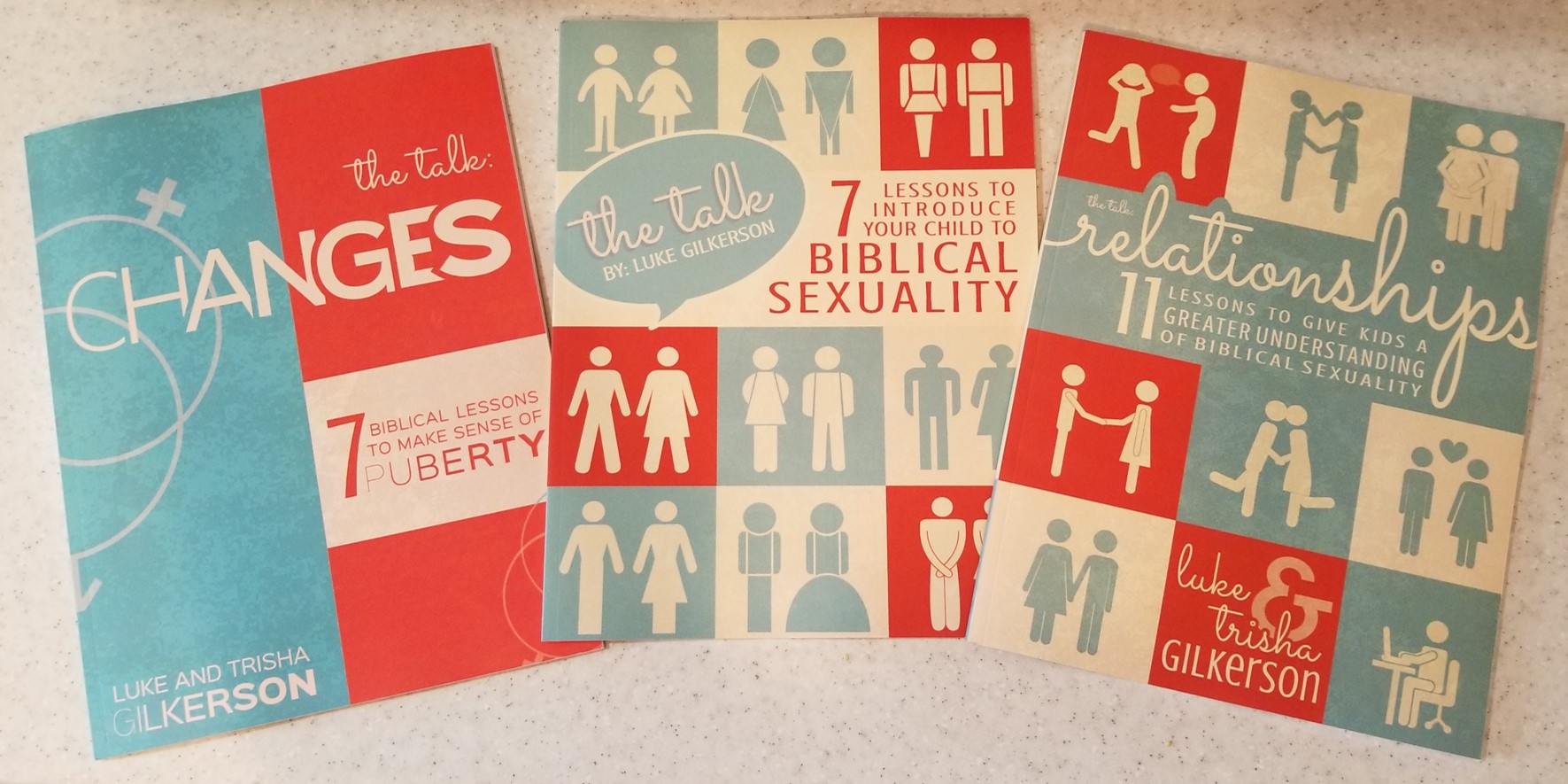I still remember sitting on our old brown couch in the basement, my parents sitting right beside me as we were watching “Degrassi Junior High” (Yes, that dates me) – a couple on the screen was making out and talking about sex. All my parents did was glace over at me and I turned bright red.
Sex was not something we talked about.
Churches, church leaders and Christian parents have often not known how to talk helpfully about sexuality and gender and so have remained silent. The other method I’ve seen happen is parents/leaders talk to the kids or youth once a year in a really awkward way where the kid inwardly or outwardly screams, just like I did, “I want to be anywhere but here!”
Church – we need to equip parents to talk about sexuality with their kids.
In today’s sexualized culture kids are receiving tonnes of messages every day about sex, sexuality and gender – on YouTube, on their phones, in on-line pop-ups, in on-line games, on Netflix, in movies, from their friends, at school, in music… And the messages culture is sending about sex and sexuality often are pushing our kids too quickly into sexualization and teaching them different values than you likely want them to have around sexuality.
I think most churches and Christian parents realize culture is not the best teacher when it comes to informing our kids about healthy sexuality and gender identity – however, they haven’t known how to help kids understand a different, Christian view of sexuality.
I’m definitely NOT an expert on this, but as I’ve been going around to various churches talking about sexual identity lately (how did I ever get into this?!) everywhere I go leaders and parents are asking how we engage our kids in understanding healthy sexuality. Therefore, I venture into this blog, not because I’m an expert but I desperately see the need for us to do better as Christians in talking about healthy sexuality with our kids.
And I do think parents are the best ones to be having these conversations with their kids. Church leaders and youth leaders can be a springboard to conversations, but it’s the parents that can continue the conversations and who carry the most weight with their kids. It’s the parents who are around the kids more often and have modelled sexuality, gender and relationships – probably in both some healthy and unhealthy ways. This is a very sensitive topic and parents know their kids best and should be the ones to talk to them about these sensitive issues, instead of another adult. If parents start having these conversations with their kids early, it opens up the communication for further communication as kids get older and as kids encounter different thoughts and situations.
I’ve always cared about the importance of modelling and communicating healthy sexuality, gender and relationships but it has taken on a new level of responsibility as I look at becoming family with an 8 and 12-year-old in my near future. I have been keenly aware as Joe and I have been dating that two sets of eyes have been watching very closely how we treat each other, how we interact, how we respect each other, how we talk to each other and how we interact physically. This isn’t just when we’re specifically talking about relationships, these sets of eyes & ears are on us all the time when we’re together.
Church, we need to speak into the lives of our kids in this super sexualized culture and help them understand there are safe, healthy, fulfilling, God-honouring ways to live out our sexuality. Church, we need to equip parents to have these conversations, in a Christ-honouring way, with their kids.
Here are some pointers for parents in talking about sexuality with kids:
1. Help kids form their identity around Christ and an understanding that they are made in the image of God. How do you do this? Celebrate all body types and shapes. Be clear that our sexuality and gender is not the primary marker that defines who we are, God does, and everyone is created in the image of God. Acknowledge when they are becoming a man/woman and celebrate this as part of God’s good design instead of something to be ashamed of. Affirm the Christ-like characteristics you see in them more often than commenting on looks, clothes or relationship-status. Help them understand who God says they are, as His valued creation.
2. The “sex” talk is NOT one talk, it is an on-going conversation. As you are going through life with your kids opportunities will come up to talk about sexuality – as you’re driving along and hear lyrics to a song, when they notice a pregnant woman, when they observe a transgender person, after changing at the public swimming pool, when they see people kissing, when they come home from school or youth group after a lesson about health/sexuality/puberty, when they comment that two dating people are or are not staying over at each others house… Use all the opportunities that present themselves to talk about healthy relationships, gender expression and sexuality. It’s so easy to avoid the conversation or to not know what to say. Lots of opportunities present themselves, if we’re looking and ready to engage. You don’t have to tell your kids everything at that moment, just talk about a little bit each time as the opportunities present themselves.
3. Establish and talk about family values. “In our family…” It’s healthy that kids form their first identity and values through their family. Establish a few family values/sayings and be sure to include some that talk about valuing others and bodies. Here are a few examples. “In our family, we treat all genders equally. (So, for example Mom can mow the lawn and Dad can bake a cake.)” “Everyone is created in the image of God, so in our family we value everyone we meet.” “We know our bodies are a gift from God, so we treat our body and other peoples’ bodies with respect.” “We respect each others privacy and can say ‘no’ if we don’t want to be touched, hugged or kissed.”
4. Be honest, real & authentic. Do not over-shelter kids, talk openly as is age-appropriate. Kids are hearing and seeing lots in the world on this. You may think you are sheltering them, but you are not and they need to hear from you, the parent, on this, not just from culture.
Talk about how to be cyber-smart and what to do when they see a pornographic image on their phone/tablet/computer or if a friend shows them a pornographic image.
Don’t assume they’ll get married (i.e. don’t say “When you get married…”) God sometimes gives people singleness and sometimes marriage, both are very good and in both you’ll need friends and a church family to also be community for you.
If your relational or sexual history is sketchy, be honest without needing to give all the details. “I made some mistakes, this is what I wish I understood…”
5. Use the proper names (anatomical terms, gender identity, LGBTQ…) and respectful language at all times. This helps kids know they can trust you to give them real and accurate information. Also, particularly as kids get older (age 7+), calling anatomy the wrong names or “cute” names just makes it seem like those things are wrong or bad to talk about, and you want them talk to you about it, so keep that door open. Let them know that these things are appropriate to talk to you about but because these things are private and special, they aren’t things to be talked about everywhere and they should tell you if anyone tries to talk to them about sexual things or touch them in an inappropriate way.
6. Give them a strong sense of love and belonging in your family. We want kids to know the good places to look for love & belonging is in family, in being treated with care & respect and in the church family. We want them to be looking for love in all the right places – from God, family and church family.
7. Do not make them see all things associated with sex or sexual identity seem “bad” or shameful. Sex and sexuality is a good gift from God. Our silence, our own shame, our vagueness or just presenting rules (“You can’t wear that shirt!”) – can make kids/youth think everything around sex is just bad and to be avoided at all costs. That’s not a good message to send! Especially when they reach the years where they want the attention of those they are attracted to. Or what happens when they realize physical touch, sexual touch, feels good and question why it could be bad. Help them understand that sex is a good gift from God, with boundaries for our safety, protection and joy. God designed sex to be a place of “no shame.” (Genesis 2:25) A place of complete honesty, realness, exposure, vulnerability and yet also complete safety, security, and joy with no shame, no regret, no guilt and no doubt. Help them see the beauty of a place, a person, a secure committed relationship of “no shame” in God’s design.
8. Model respect and love in your relationships with all. Kids need to see modelled how men and women should treat each other, how we treat singles, how we treat those that identify as LGBTQ… It’s one thing to say to them in conversation that “Men and women should respect each other at that means listening to each others ideas, respecting when they say ‘no’ etc.” but if then they see you turn around and belittle someone or not listen to someone’s ‘no’ they are absorbing a very different message. Modelling in the area of healthy relationships and sexuality is so important. Our kids need families, couples and singles that are modelling Christ-centred living.
Here’s a resource I’d recommend for parents. It’s three workbooks parents go through with their kids together. Ideally the authors recommending the years between six and ten as a good time to begin these conversations about sexual intercourse and God’s purposes for sex.
Dear Youth/Kids Ministry leader – please tell parents when you are talking about sex and sexuality at your group, so that parents have the opportunity to continue the conversation with their kids. Aid the conversation parents want to have with their kids, instead of taking the opportunity away from them.
Thank you! Thank you for being willing to wade into these conversations for the sake of our kids growing up with a healthy, godly understanding of sexuality. I know it’s not easy, BUT it is worth it. Our kids need us.
I’ll be praying and cheering you on!
Plus, I hope to see you at the NEXT Children’s Ministry Conference April 6, 2019. http://cbacyf.ca/next


